
|
||||||||||||||||||||||
 |
||||||||||||||||||||||
 |
||||||||||||||||||||||
 |
||||||||||||||||||||||
 |
| The current issue is always free to everyone |
|
|
 |
 |
There was none of this walking about, plugged into the Borg. Children and parents weren’t manipulated into communicating through cable wires or satellites, and there were no commercials calling the movement away from community - progress then. The live “show” in the neighborhood and in our homes was the reality. Some women, like one of my aunts, “did hair” in the community. Other women, like my mother, baby sat for the neighbors’ children. They didn’t need an associate degree or a license then. The ladies of solidarity were an autonomous contingency of women who dominated the neighborhood catholic church and school with their decisions about church proceedings and school curriculum. To my knowledge, they were just concerned parents and not “education specialists.”
Every child belonged to every adult and even the “lady on the corner” at night would report to a parent about a “stray” child out past curfew. The winos at the el stop knew when to expect children back from the movies downtown. Ice Jacket, in his black leather jacket, was our silent resident “thug,” the brother of the quiet girl, “Miracle Child,” and son of the woman upstairs that my grandmother made sure had enough sugar or rice. All the windows of apartments and homes had an elderly “spy” behind the curtains. All phone calls between teens were monitored by a parent sitting nearby. Police tactical urban units and government surveillance weren’t needed to keep “order.” My grandfather’s boss, the landlord, bearing
gifts at Christmas and Easter, sat for dinner at my grandparent’s
dining room table. At home, I was “young lady” and in the neighborhood
I was “Mr. Priestley’s grandchild.” My grandfather, a janitor
of five buildings in the neighborhood, Mr. Hector the newspaper
man at the corner, the “lady on the corner,” our elderly neighbors,
our shoe, fried chicken, A&P groceries, soda fountain, “dime”
discount, and hardware store merchants, our priests, nuns and
lay teachers, the ladies of solidarity, precinct captains, and
older children, assured us that all was safe and well in our
neighborhood. We were a generation that didn’t need Mr. Rogers
to sing about the neighborhood or neighbors then. It wasn’t
the reality everywhere in I knew we were colored, Negroes for a while,
until high school when the older teens and young adults said
to say Black. James Brown said Black, “I am Black
and I am proud.” Stokely Carmichael said Black, and we
tussled with the older adults who said Negro and we finally
talked back and said Black! Things were going to be better
in our community because we said Black, because we were learning
to connect with other Blacks outside our community, even outside
the Our parents, grandparents, teachers, and neighbors breathe life into our voices. They gave us permission to speak among them while Black Movement trained our thought to recognize our individual selves in the other, in our collective being. Our maturity depended on this progression of body, soul, and voice.
Today, the white power structure, the imperialist hegemony deems the very word “race” to be outlawed. The very word “race” is equated with the word “n-----.” Don’t utter that word; don’t utter the word “race” and all will be well. The imperialists mean to bleed any discussion, or worse, cultural identity with Blackness among Black Americans. They are asking us to take the rhythm, cadence, and the message of liberation out of our sermons and speeches - don’t sound like Rev. Jesse Jackson, Rev. Al Sharpton or Rev Jeremiah Wright - sound like a Black political candidate or sound like the “hyper-articulate” Condi Rice. How we speak to each other and what we say to one another is under attack. Be not Black but American - meaning WHITE, middle-class - and the “race” problem will go away because - what will be left in the message of those who speak to our Black American experience? What is within a people who fear so much, who are so threatened by the other that they will demand - DEMAND - of us to speak, but remove the blood running in our veins first. Speak, but remove what connects you to each other and to each other’s experiences in Amerikka and to our Ancestors. We are now asked to repudiate our own BLOODLINE. To denounce and reject ourselves as so much “incendiary” language and so much “angry” flesh. The audacity! This message is delivered by willing surrogates of imperialism.
“Afro-racism” is yet another infamous image tossed
up to the American public in order to silence any opposition
from the Black masses, the Black Left. “Afro-racism” means what?
It means that the imperialists are scared again and they need
a distraction - a convenient and familiar distraction from the
American public’s attention on the slaughter of Iraqis - the
Black Americans. Our Blackness is once again used as a distraction
to take attention away from the Empire’s domestic and foreign
policies, from the over 100,000 dead (liberated?) Iraqis, from
the half-trillion spent pursuing the deaths of other people
in a “pro-American” campaign. “You are either with us or against
us.” The problem with Prejudice, maybe. Maybe some Blacks hold prejudices as do most people. But racism is systemic and institutionalized. It requires the force of power we as Black Americans don’t have, no matter how many times Condi Rice shops at Ferragamo’s. Her consumerism furthers the power of imperialism; it doesn’t erase the power needed to enforce systematic and institutionalized racism. The image of Condi Rice flying off to another shopping spree isn’t progress! It isn’t a worthy substitute for those Black women who pulled a community together against all odds and all forms of disruptive tactics. Another white can’t determine if a fellow white
is racist or not. The latter would have to be observed in interaction
with Blacks, Browns, Reds and with Iraqis at three in the morning! That Iraqi or Chicano will recognize
racism through that slight gesture or that LOOK or that dismissive
chattiness we encounter daily lives in Say, “We are good.” “YOU ARE GOOD.” Say, “We are liberating you.” “YOU ARE LIBERATING ME.” And they are ringing our collective necks and pulling the rope tighter.
What happened? White fear happened again. When some of us lost our focus and adapted to this absurdity and fear, we lost our sense of communalism, and losing sight of that community (for glittering trinkets), we lost our footing in the battle against racist imperialism. We can’t be a little capitulating, a little pregnant with the benefits and goals of imperialism reeking of racism and expect to maintain our humanity. It’s not a little bit monstrous; it’s monstrous to repress a people and yet continue to ask that we, Black Americans, engage in the repression of ourselves. Censor yourselves now! Distance yourself from the EMENY within your neighborhoods, your community--within you! Be ashamed to be BLACK!
We must maintain our tradition of communalism, and hold on to our theology of liberation, and hold on our narratives of liberation. This is the promise we made to our Ancestors, our bloodline, to oppose imperialism and its many campaigns of assault. BlackCommentator.com Editorial Board member, Lenore Jean Daniels,
PhD, has been a writer, for over thirty years of commentary,
resistance criticism and cultural theory, and short stories
with a Marxist sensibility to the impact of cultural narrative
violence and its antithesis, resistance narratives. With entrenched
dedication to justice and equality, she has served as a coordinator
of student and community resistance projects that encourage
the Black Feminist idea of an equalitarian community and facilitator
of student-teacher communities behind the walls of academia
for the last twenty years. Dr. Daniels holds a PhD in Modern
American Literatures, with a specialty in Cultural Theory (race,
gender, class narratives) from
|
Your comments are always welcome. e-Mail re-print notice
If you send us an e-Mail message we may publish all or part of it, unless you tell us it is not for publication. You may also request that we withhold your name. Thank you very much for your readership. |
|
| March 27, 2008 Issue 270 |
|
| Executive Editor: Bill Fletcher, Jr. |
| Publisher: Peter Gamble |
| Printer Friendly Version in resizeable plain text format format |
 |
 |
 |
| |
| |





















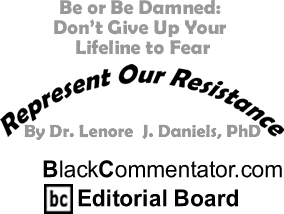

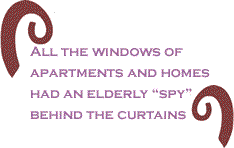 Parents
and grandparent, like my grandfather, walked children to school
and walked the halls before the classroom doors closed. Women
worked in offices downtown and others received “checks”
Parents
and grandparent, like my grandfather, walked children to school
and walked the halls before the classroom doors closed. Women
worked in offices downtown and others received “checks” 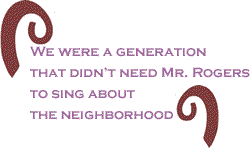 Then
something happened to our neighborhood, our community. I can’t
imagine what these people would think now if they were alive
- my parents, grandparents, Mr. Hector, the “lady on the corner,”
the winos, the nuns, priests, the merchants, the landlord, the
elderly neighbors, the ladies of solidarity, even Ice Jacket.
Some kind of “shock and awe” show came in from the outside,
to be sure, but something happened, too, that allowed the disaster
into come in our back yard.
Then
something happened to our neighborhood, our community. I can’t
imagine what these people would think now if they were alive
- my parents, grandparents, Mr. Hector, the “lady on the corner,”
the winos, the nuns, priests, the merchants, the landlord, the
elderly neighbors, the ladies of solidarity, even Ice Jacket.
Some kind of “shock and awe” show came in from the outside,
to be sure, but something happened, too, that allowed the disaster
into come in our back yard. 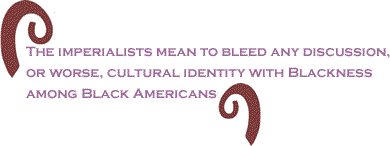
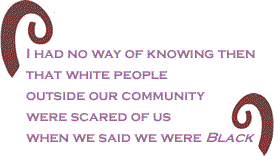 I
had no way of knowing then that white people outside our community
were scared of us when we said we were Black. Some of
us were young and perhaps naive and maybe, too, innocent in
that we were ignorant of the “innocence” of a larger community
surrounding us. We
I
had no way of knowing then that white people outside our community
were scared of us when we said we were Black. Some of
us were young and perhaps naive and maybe, too, innocent in
that we were ignorant of the “innocence” of a larger community
surrounding us. We 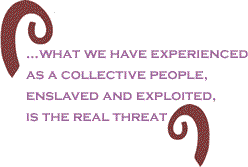 Don’t
throw our Ancestors, our ancestry to the wolves. Understand
that what we know of white
Don’t
throw our Ancestors, our ancestry to the wolves. Understand
that what we know of white 





